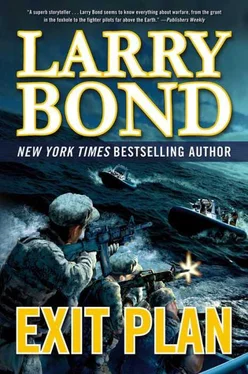“Right. We’ll rendezvous down at the Bandar Shenas breakwater in four hours. See to it you’re on time.”
“Hooyah, sir.” A halfhearted salute accompanied Lapointe’s response.
Ramey gave his LPO a rough slap on the shoulder, rose, and faced Jerry. His gaze was icy, his voice mechanical. “I’m leaving Petty Officer Lapointe in your care, sir. He’s your responsibility. I expect to see him at the breakwater when we return.”
Jerry could tell that the young officer was still struggling with their blowup earlier. But his message was crystal clear, even though he hadn’t said the words — don’t leave anyone else behind. “Understood, Lieutenant, and good luck.”
Ramey didn’t acknowledge Jerry’s well-wishing and started to leave. But after a couple of steps, he stopped and looked over his shoulder. “Remember, if we aren’t back by 0500, XO, grab one of those fishing boats and make a run for it.”
“Hope for the best, but plan for the worst, Mr. Ramey?” questioned Jerry.
“Of course, sir,” he said soberly. “If we aren’t back by five, odds are we aren’t coming back.”
8 April 2013
0030 Local Time/2130 Zulu on 7 April
1st Regiment Headquarters, 47th Salam Brigade, Bandar Lengeh
Rahim pored over all the reports again, comparing each of the times and positions to those displayed on the map, looking for something that would tell him where the enemy had gone. Nothing! He threw the reports on the table with frustration and rubbed his face. It had been over twenty-four hours since the last attack, and they hadn’t come any closer to finding the traitors or the Americans. How could they move so fast with wounded members? Were they still on foot? Or did they manage to commandeer another vehicle? Did they head back to the northwest, breaking their pattern of the last four days? Or did they head into the hills to the north? Finding them in such rugged terrain would be extremely difficult. His questions seemed endless, and all of them were unanswered.
He yawned and stretched, fatigue was grinding his ability to think to a halt. It had been over thirty-six hours since he last slept, and he’d kept going by sheer force of will and an abundant supply of coffee. Most of the additional troops had arrived as promised, and the security at the airport, harbor, and all of the nearby checkpoints had been beefed up significantly. Dedicated search-and-destroy teams would be deployed later in the morning, supported by aviation assets. He’d reviewed the detailed search plan developed by Colonel Yavari’s staff and deemed it acceptable. If the fugitives believed they could simply go to ground and hide until things calmed down, they were sadly mistaken. Rahim took some encouragement from that last thought, for if true, it meant the traitors were unaware of the plan that he and General Moradi had put into play.
Yawning again, Rahim concluded that any further attempts to keep working would be a waste of time; he really did need some rest. He had to be refreshed for the activities later in the day. After writing a short note to remind himself to discuss augmenting the command center staff with Colonel Yavari, Rahim slowly made his way to the cot put up for him at the back of the office. Collapsing onto the stretched fabric, sleep came quickly.
8 April 2013
0230 Local Time/2330 Zulu on 7 April
Port Cargo Storage Area, Bandar Lengeh
Ramey, Fazel, and Phillips leaned up against the stack of loading crates stored near the water’s edge. This was the designated operational readiness position, or ORP they’d selected from imagery, the launching point for the water phase of their mission. The harbor at Bandar Lengeh, like many Iranian ports, was constructed using three breakwaters. The nearest one was a two-hundred-meter-long segment that ran straight out into the gulf. The second breakwater was farther away, and it was the longest of the three. Built in the shape of a crescent, it formed the back and side of the harbor. The last breakwater was an artificial island; offset about two hundred meters from the harbor entrance, it protected the mouth from any waves that came directly from the southwest. The platoon leader carefully surveyed the two breakwaters connected to land with his infrared sight and noted the guards walking their beat. A well-armed fast boat was just exiting the harbor, departing on patrol.
It had taken the SEALs longer than anticipated to complete the land portion of their plan; there had been a lot of patrols along the beach. A typical SEAL could have run the 11.5 kilometers from their layup position to the edge of the storage area in about an hour, but Ramey and company had spent a lot of time on their bellies crawling through the sand, rock, and short scrub. Twice, a Pasdaran patrol walked within meters of where the SEALs lay, oblivious to their presence. Travel got a little easier once they reached the edge of town, where the pathways and unlit streets enabled them to safely pick up the pace.
“Okay, gentlemen,” Ramey whispered. “We hit the water here. I can only see one guard on the curved breakwater. It’s much more likely there are two, possibly more, as that section is a lot longer. If you have to take them out, use your knives only. Clear?”
Both Fazel and Phillips nodded in silence.
“Pick a fast-looking boat and tow it behind the dhows. After I set the charges on the IRGC patrol boats, I’ll meet you at the exfiltration ORP by the far breakwater. Any questions?”
Both shook their heads no.
“Alright, then, let’s get ready,” ordered Ramey.
As one SEAL removed his camouflage jacket, rolled it up, and stuffed it into his pack, the other two kept watch. The green t-shirt and darkly camouflaged arms offered less of a contrast against the water than the lighter jacket, and it would make swimming a little easier. One by one they crawled from behind the crates and down the rocks lining the harbor wall, slipping silently into the water.
During the planning session, it became clear from new imagery that the landward approaches to the harbor were just as reinforced as the airport. But unlike the airfield, which could only be approached by land, the harbor had another, more difficult to defend avenue — the sea, and that suited Ramey just fine. Unlike other Special Warfare soldiers that see water as an obstacle, to the SEAL it is a sanctuary. When SEALs find themselves in trouble and have the option, they always head for the water.
The trio swam quietly but steadily toward the closest of the three breakwaters. The water was on the cool side, but definitely warmer than their earlier swim the night the ASDS sank. A light wind was at their backs, from the southwest as expected. The slight waves it generated could be heard breaking on the rocks, helping to mask what little noise the SEALs made. They traversed the open water swiftly, and then hugged the base of the breakwater around into the mouth of the harbor.
Fazel and Phillips broke off at that point, swimming across the harbor entrance, after making sure no one was entering or leaving port. It was only 150 meters to the other side and they used the channel marker light as their guide. Ramey continued to follow the breakwater around, heading toward a small pier that jutted out from the rocky base. The harbor buildings were illuminated and he could make out the silhouetted forms of two IRGC patrol boats berthed at the pier. Following the breakwater, he inched slowly toward the small jetty. He was halfway there when he heard someone walking above him; he froze. A guard was making his rounds. Ramey could see a flashlight being waved about as a Pasdaran soldier made a halfhearted search along the water’s edge. Without a sound, the platoon leader slipped under the surface and swam away from the breakwater, toward the pier and his intended targets.
Читать дальше












